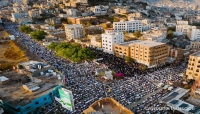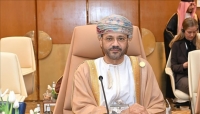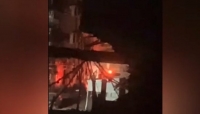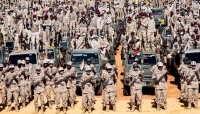Latest
Yemen conflict leaves impact on judiciary
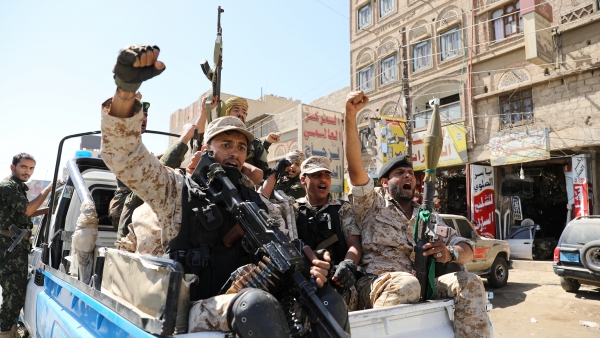
Wednesday, 25 March, 2020 - 04:50 Pm
The conflict in Yemen is no longer limited to political and military parties. It now includes the judiciary, which is being used to execute political agendas between the warring sides.
On March 3, the Houthi-controlled Specialized Criminal Court in Sanaa sentenced to death 35 parliamentarians in absentia on charges of treason, ordered the confiscation of their movable and real estate property inside and outside the country, and put them in the hands of the Houthi government.
This is not the first time the same court has passed sentences of execution.
In July 2019, 30 academics and political opposition figures were sentenced to death following a trial Amnesty International described as a “sham,” saying those people “are facing trumped-up charges, including espionage for the Saudi Arabia-led coalition, following a fundamentally flawed legal process.” None of the accused have been executed, and they are still being detained in Houthi prisons in Sanaa.
The list of figures recently sentenced includes parliament Speaker Sultan al-Barkani and his deputy, Abdul-Aziz Jubari, in addition to parliamentarians in the General People’s Congress that was formerly led by ex-President Ali Abdullah Saleh, and the Yemeni Congregation for Reform — known as al-Islah, the Yemeni Muslim Brotherhood arm. All of the sentenced reside outside Yemen or in areas controlled by the internationally recognized government.
The death sentence came after the public prosecutor put the accused parliamentarians on trial in September after their immunity was lifted. Charges include threatening the independence and safety of Yemeni territories and collaborating with foreign countries, like Saudi Arabia and the Arab coalition states.
Elected in 2003, the current parliament was divided between Houthis and the government after the pro-government members met in Seyon and elected new leadership in April of last year, headed by Barkani. Meanwhile, Yahya al-Rai continued to head the Sanaa-based parliament. The pro-government parliament is the one recognized internationally and represents the government in regional and international platforms.
The social implications of these charges will lead to divisions and tensions between the tribes supporting them and those opposing them, and among the people who voted in favor of the sentenced parliamentarians. In Yemen, generally, tribal ardency rather than democracy or civil dedication prevails in supporting parliamentarians. Besides, if Houthis face military defeat in the Yemen war, the tribes opposing the sentences will likely retaliate against prominent Houthi figures, especially since most parliamentarians belong to well-known and influential tribes in Yemen or are traders and large capital owners.
According to the Human Rights Office in Geneva, “Following the issue of the sentences in Sanaa, we received reports that the homes of some parliamentarians in Sanaa were ransacked by a group of female Houthi police. The police gave the family members inside the homes 24 hours to leave their properties.”
In a March 6 statement, the Human Rights Office called on the sentences to be revoked and said the trials are “politically motivated [and fail] to comply with international norms and standards.”
Noura al-Jarwi, director of the Coalition of Women for Peace in Yemen, told Al-Monitor the “Houthis had a racial and linear approach to the case.” She expects a “reaction from the parliamentarians’ supporters, especially if the balance of power changes in favor of Houthis’ rivals. This will only lead to further division in Yemeni society.”
One of the sentenced members of parliament told Al-Monitor on condition of anonymity for the safety of his relatives in Sanaa, “The houses and belongings of several sentenced members of parliament were confiscated, including some real estate assets. Their families in Sanaa were also harmed and threatened.”
The member of parliament said, “The verdict is political and has absolutely no relation to the constitution or law. Many do not recognize it and consider it a terrorist act.” He blamed “the United Nations and its special envoy to Yemen, Martin Griffiths, for what happened.”
Meanwhile, some prominent figures known for their opposition to Houthis were not sentenced, such as tribal Sheikh Hamid al-Ahmar, who is close to Qatar and lives in Turkey. Some observers believe those were excluded based on political arrangements involving countries in the region like Qatar, Turkey and Iran.
Mohammad Abdul Quddus, deputy editor of the Houthi-run SABA news agency, told Al-Monitor, “The verdicts are legitimate based on the Law of Criminal Procedure, and those parliamentarians are fugitives. The prosecution met all legal conditions in filing the lawsuits after proving the accused jeopardized the independence of the state and the safety of its territories by asking the aggressing countries to attack Yemeni territories.”
He added, “Ansar Allah [Houthis] have nothing to do with this, and the verdict was an implementation of the law. The parliament in Sanaa lifted the immunity of the sentenced members of parliament.”
On Nov. 13, 2019, the Yemeni government had called on the UN to prevent Houthis from conducting illegal and arbitrary trials against rights activists, journalists, women and members of parliament.
In December, the Supreme Judicial Council in Aden issued a decision ordering “the illegitimacy of courts in Houthi-controlled areas and their subsequent illegal verdicts and considered them a form of extortion and money collection.”
Yehya al-Shouaibi, a lawyer, told Al-Monitor, “The so-called Specialized Criminal Court in Sanaa does not have constitutional legitimacy, and its sentences are null and void.”
The conflict in Yemen has undoubtedly taken dimensions other than the political and military ones. If the judiciary is not kept out of it, society will be largely divided and the UN-led peace process will face another hiccup.

